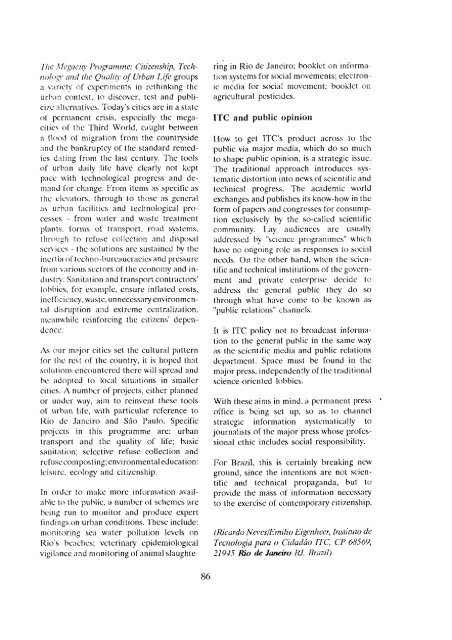ifda dossier 74 - Dag Hammarskjöld Foundation
ifda dossier 74 - Dag Hammarskjöld Foundation
ifda dossier 74 - Dag Hammarskjöld Foundation
You also want an ePaper? Increase the reach of your titles
YUMPU automatically turns print PDFs into web optimized ePapers that Google loves.
The Afcgac~n l'rogratnine: Citizenship, Techni)!op<br />
and the Qiiulity of Urban Life groups<br />
I variety of cxperinients in rethinking the<br />
url\in context, to discover, test and public17c<br />
alternatives. Today's cities are in a state<br />
ot permanent crisis, especially the megacities<br />
of the Third World. caught between<br />
a tlood of migration from the countryside<br />
and the bankruptcy of the standard remedies<br />
diiting from the last century. The tools<br />
of urban daily life have clearly not kept<br />
pace with technological progress and demand<br />
for change. From items as specific as<br />
the elevators, through to those as general<br />
as urhiin fiicilities and technological processes<br />
- from water and waste treatment<br />
plants, terms of transport. road systems,<br />
through to rctuse collection and disposal<br />
services - the solutions are sustained by the<br />
inertia oftecli~~n-bureaucracies and pressure<br />
from v:irious sectors of the economy and in-<br />
dust~y Sanitation and transport contractors'<br />
lobbies, for example, ensure inflated costs,<br />
inelficiency, waste, unnecessary environmcn-<br />
t:il disruption and extreme centraliz,ation.<br />
mc;~nv.hilc reinforcing the citizens' depen-<br />
di~ice.<br />
As our major cities set the cultural pattern<br />
for the rest of the country, it is hoped that<br />
solutions encountered there will spread and<br />
he adopted to local situations in smaller<br />
cities. A number of projects, either pliinncd<br />
or under way. aim to reinvent these tools<br />
of urban life, with particular reference to<br />
Rio dc Janeiro and S20 Paulo. Specific<br />
projects in this programme are: urban<br />
transport and the quality of life: basic<br />
sanitation; selective refuse collection and<br />
refusecornposting; environmental education:<br />
leisure, ecology and citi~cnship.<br />
In order to make more information available<br />
to the public, a number ol schemes are<br />
I'ieing run to monitor and produce expert<br />
findings on urban conditions. These include:<br />
n~onitoring sea water pollution levels on<br />
Rio's he~iehcs: veterinary epidemiological<br />
vigilance and n~onitoring of animal slaughte-<br />
ring in Rio de Janeiro; booklet on informa-<br />
tion systems for social movements: electron-<br />
ic media for social movement; booklet on<br />
agricultural pesticides.<br />
ITC and public opinion<br />
How to get ITC's product across to the<br />
public via major media, which do so much<br />
to shape public opinion, is a strategic issue.<br />
The traditional approach introduces sys-<br />
tematic distortion into news of scientific and<br />
technical progress. The academic world<br />
exchanges and publishes its know-how in the<br />
form of papers and congresses for consunip-<br />
lion exclusively by the so-called scientific<br />
community. I-ay audiences are usually<br />
addressed by "science programmes" which<br />
have no ongoing role as responses to social<br />
needs. On the other hand, when the scien-<br />
tific and technical institutions of the govern-<br />
ment and private enterprise decide to<br />
address the general public they do so<br />
through what have come to be known as<br />
"public relations" channels.<br />
It is ITC policy not to broadcast informa-<br />
tion to the general public in the same way<br />
as the scientific media and public relations<br />
department. Space must be found in the<br />
major press, independently of the traditional<br />
science-oriented lobbies.<br />
With these aims in mind. a permanent press<br />
office is being set up, so as to channel<br />
'<br />
strategic information systematically to<br />
journalists of the major press whose professional<br />
ethic includes social responsibility.<br />
For Bra~il, this is certainly breaking new<br />
ground, since the intentions are not scientific<br />
and technical propaganda, but to<br />
provide the mass of information necessary<br />
to the exercise of contemporary citizenship.<br />
(Ricardo NeveslEtnitio Eigenheer, Itis~ituio<br />
de<br />
Tecnologia para o Cidadao ITC, CP 68569,<br />
2194.5 Rio & Janeiro IV, Brazil)
















